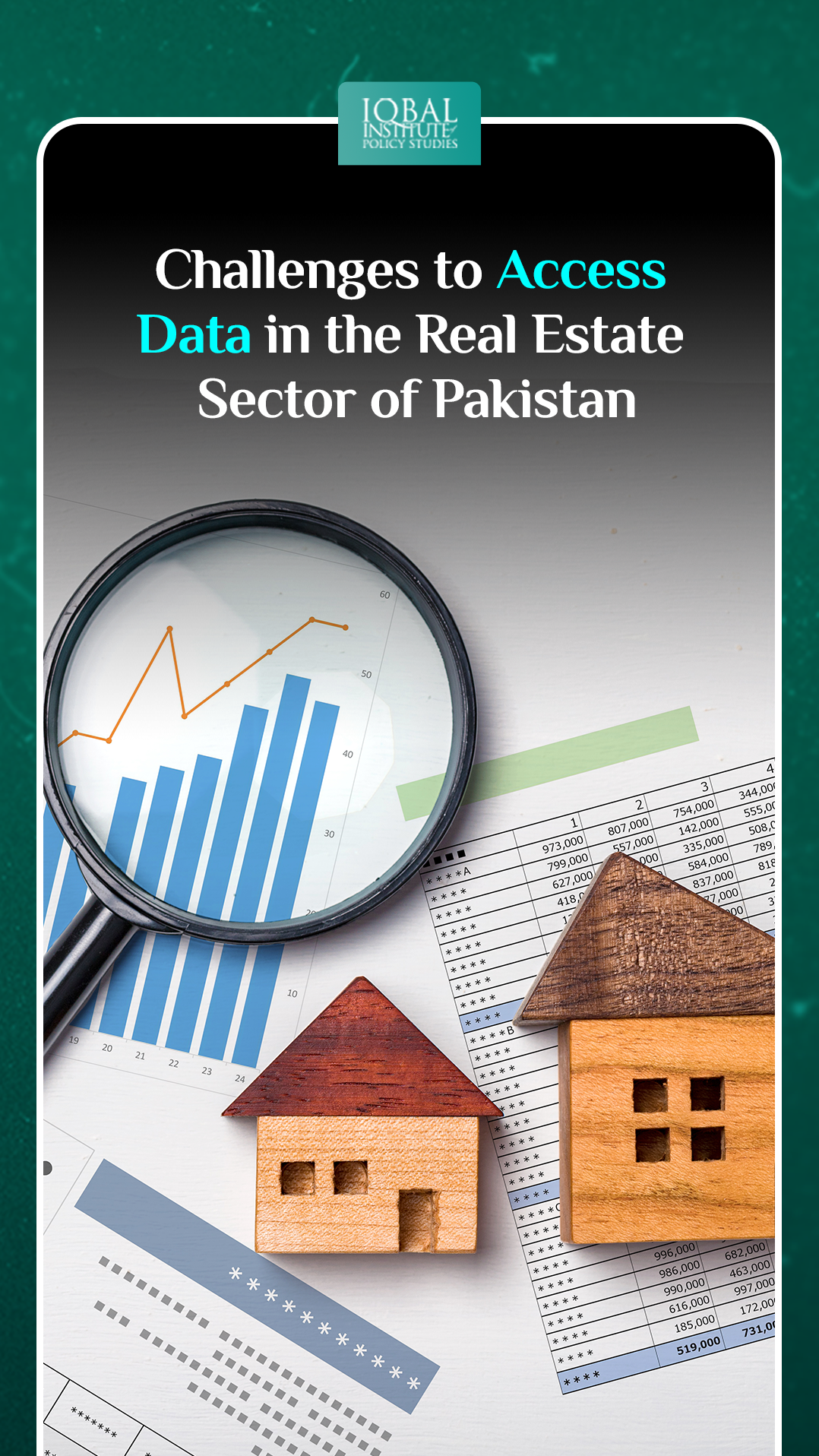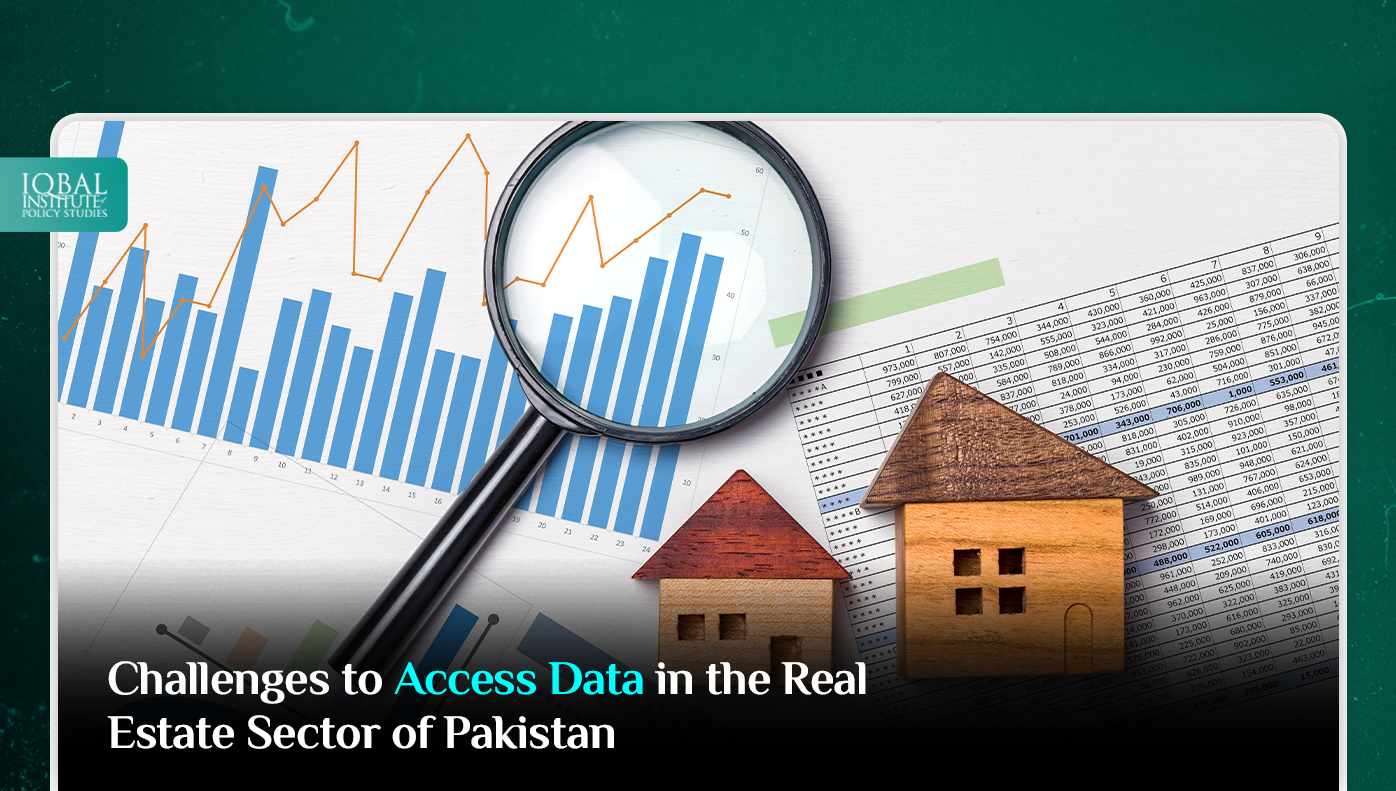The real estate sector is a competitive marketplace with great potential to boost a country’s economy. The information required to keep up with the competition and make timely decisions in this sector has shot up the significance of data. Data and information are the fundamental pillars of any society. It affects how organisations do business. Accurate, authentic, and verified data allows them to make more keen decisions, facilitating more accurate predictions about risk and market trends. However, in countries like Pakistan, lack of access to reliable data, restricted transparency, and unawareness results in dead capital in the real estate sector. One of the major reasons for this is the need for more collection and documentation of data. The government needs more funds to do so. Also, the system needs to be completely digitalised to cope with internal standards.
Furthermore, this sector needs regulatory authorities and proper planning, leading to malpractices like lack of verification, fraudulent listings, and false documentation. Investments are misappropriated and do not contribute to the overall transitional economy. Trust issues between investors and agent limit or block out investments, adding to the economy’s inefficiency. The challenges faced by the real estate sector of Pakistan are listed as follows.
Challenges to Lack of Access to Data
Lack of Legal Authorities to Collect and Document Data
In Pakistan, the quality of data collection is not up to international standards. Manual methods of census proposed by the Britishers are practised. Furthermore, new research is restricted to government employees only who rarely use it efficiently. Foreign advisors whom the government funds confiscate their collected data and exit the country without a trace. This classified nature is due to the country’s conservative and strict rules and regulations, which, when invoked, can result in consequences. Sharing of such information is an offence to the law. No legal or regulatory authority is present to collect, update and document all the data.
Lack of Use of Technology to Digitalise Data:
The introduction of technology introduces components of transparency, visibility, and accountability for all current state affairs. According to the 2020 Index, Pakistan ranks in the 124th position regarding corruption, dishonesty, and greediness. Thus, the digitalisation of data is avoided. Moreover, building an industry mindset and making people adapt to technology is time-consuming and challenging. Social changes of such type require careful management from all organisations under the supervision of cultural change experts.
Lack of Funds to Update/Modernise the system
Since our country’s economy is struggling, more funds must be needed to modernise or update the system. Also, the fund’s approval process could be more timely and varied. Challenges like corruption, black money, and money laundering may impact the engagement, delivery, and morale of the party that works with the government.
Political Instability or Frequent Leadership Changes
The role of a leader of a country is most important as he directs the entire nation on a single course. However, Pakistan’s political system is erratic. There is a frequent change in the leaders of the country. Projects and development made by one leader lose their significance once the leader is switched. The majority of these projects cater to the interest of politicians. Hence, they amend the policies accordingly. Therefore, using funds on projects like data collection and updating the system does not see the light of day.
Lack of Awareness to access information
Lack of awareness and knowledge restricts the public from knowing their rights. They have the right to access information, data, freedom of speech, and expression. Nevertheless, they are only allowed to access limited information. The government’s information to the public includes annual reports, official gazettes, and limited records of concerned government departments, court proceedings, budgetary websites, and so on. This indicates a need for more trust and confidence between the general public and the government. Moreover, there needs to be more transparency in accessing information due to insufficient and unsuited regulatory authorities.
Effect on the Real Estate Sector
Misinformation About the Real Estate Sector
Due to a lack of access to secure and authentic data, people rely solely on the broker’s offerings. As a result, their investments are misappropriated. There must be proper data or documentation about the agent, buyer, seller, or developer. Thus, investment in this sector is more like trial and error.
Limited Real Estate Educational Resources
There need to be more qualified real estate professionals in Pakistan. Most individuals are running this business only based on their experience. They need to gain the skill to guide people properly. Moreover, insufficient websites can provide useful and reliable information to clients about the real estate industry or market knowledge.
Lack of Planning
The majority of the land in Pakistan needs to be planned or approved. Less the 0.5 % of projects are planned. There needs to be proper digitalisation of the land or data.
Poor Regulation
Heavy taxation, changes in policies, and over-regulation by the regulatory authority make it difficult for the real estate sector to give its full potential.
Malpractices in Real Estate Sector
Lack of Verification
Investors need help accessing accurate data that can verify the credentials or records of agents and developers. As a result, they are easily scammed or experience public fraud.
False Listings
The absence of information on regulatory authority websites has resulted in increasing fraudulent listings in the country. There is no foolproof system, check and balance, or authentic reviews by the authorities to highlight the scammers.
False Documentation
Properties with fake documentation are prepared and presented before the clients without evidence. This is a very common practice in real estate transactions due to the need for a proper verification system.
Unreliable Agents
Agents take advantage of unsusceptible buyers by either disappearing with the money or failing to deliver what was promised. As a result, a trust barrier is created between the client and agent, leading to tight investments.
Recommendations
Countries like Pakistan should finance projects promoting data collection, distribution, and analysis. For this purpose, an archival data bank must be created along with its distribution body for easy access to data. Moreover, it will help in social and economic development as well.
Data collection can be made possible by introducing IT in the public and government sectors. In the long run, processed data can aid future planning and good decision-making. Information and data collection process do not require human interaction. This process can allow citizens to access data anytime without permission from the officials.
Secure and reliable digital access is critical to access comprehensive, reliable, and timely information regarding various on-ground situations. For this purpose, the use of modern technology to gather updated and digitalised data in all fields shall be implemented. The availability and accessibility of this information on regulatory authority websites should be available to the general public.
Government should make policies on data governance to overcome data shortage, data backup, data monetisation, and data sharing protocols. These policies are necessary to ensure all public service and public policy articulation.
Conclusion
With the increasing demand and dependence on data in the market, one cannot deny its importance. The digital transformation of Pakistan is crucial at the moment. Using effective technology, artificial intelligence, IT programs, and good governance can accelerate the data collection process. A well-documented and processed data, managed by the regulatory authority, can help in the efficacy of the country’s economy. If these factors are not acted upon, then lack of awareness and inaccessibility of data and information will lead to malpractices, hindering the state’s development.



Leave a Reply